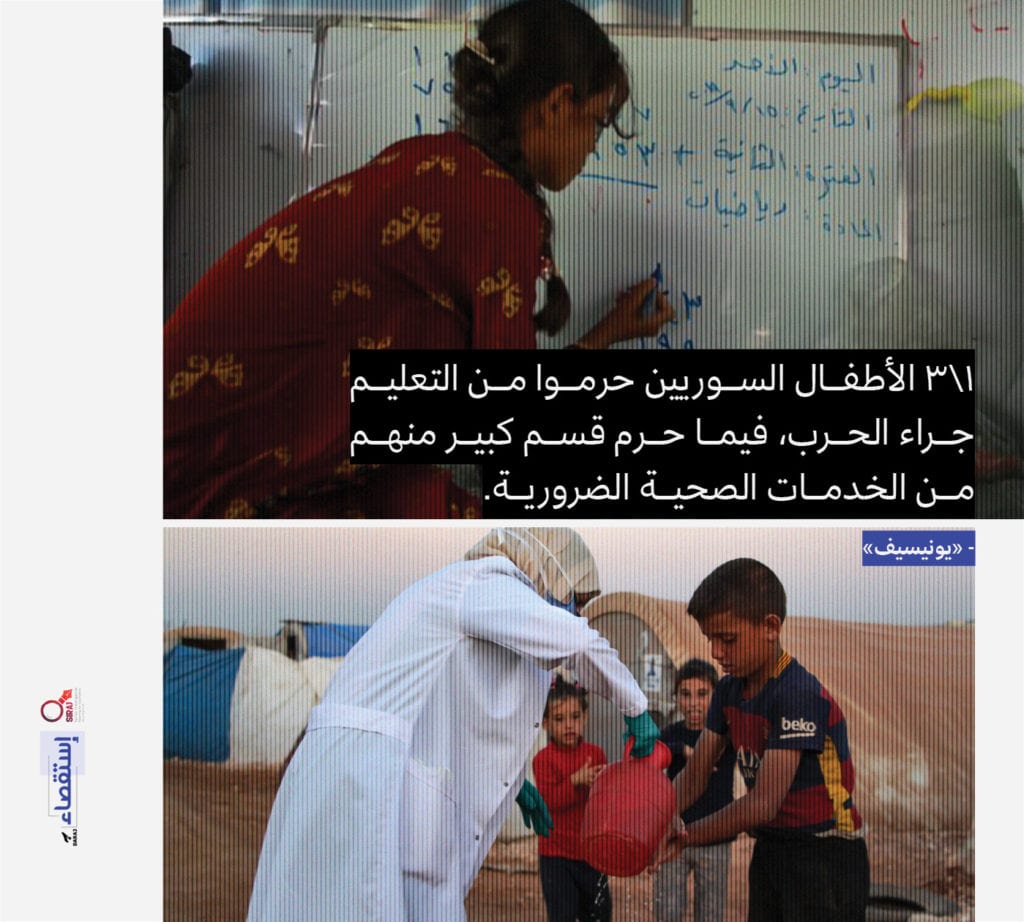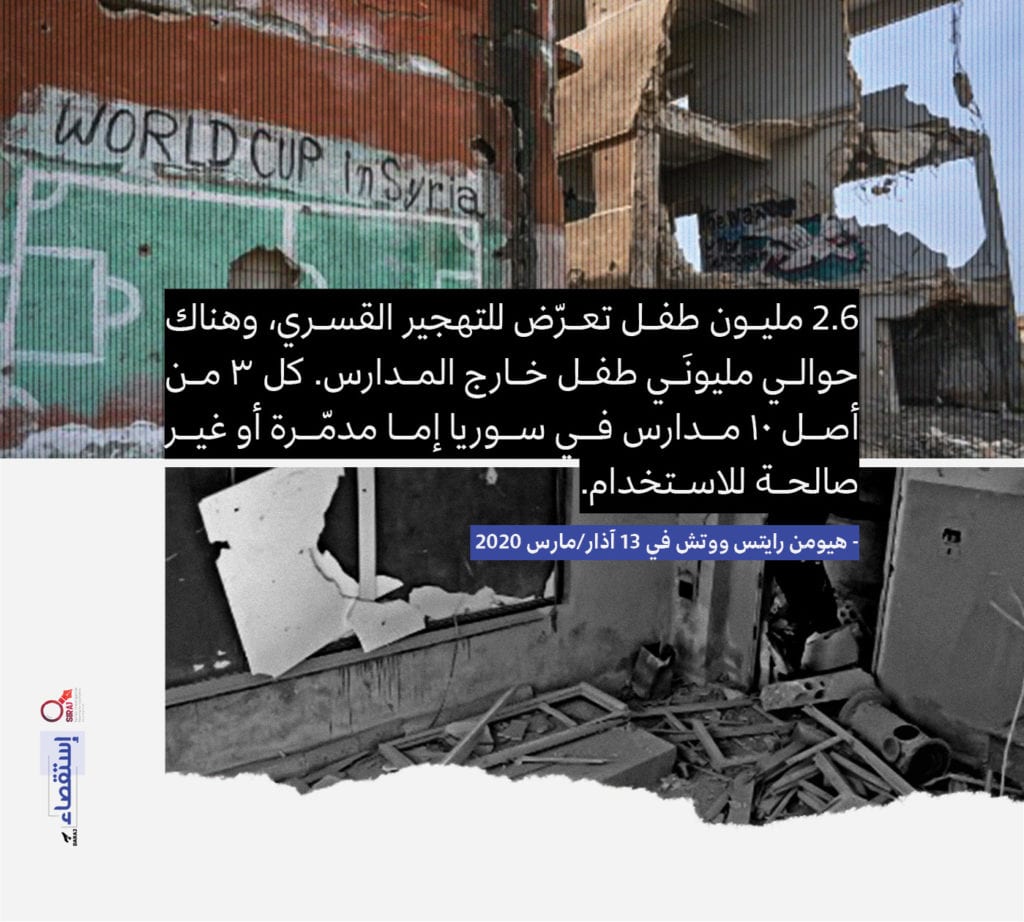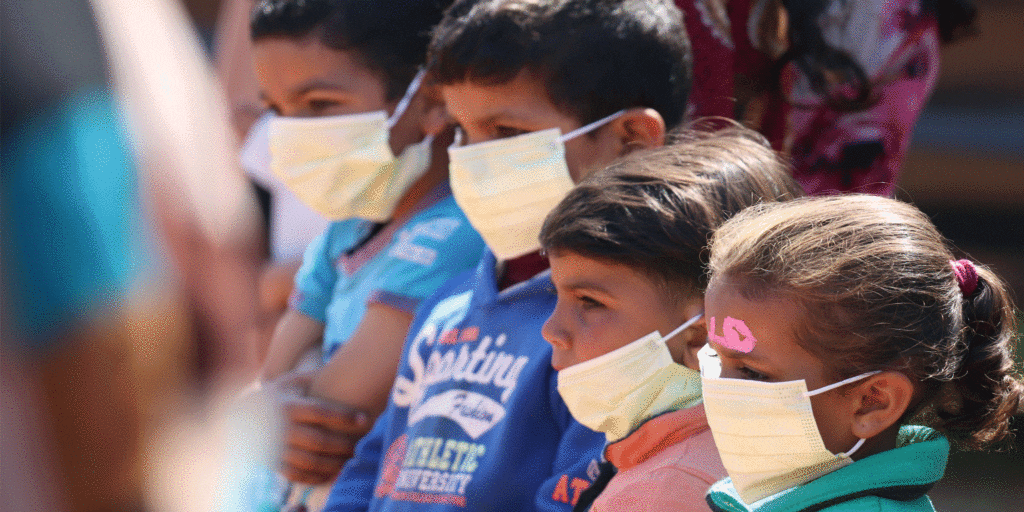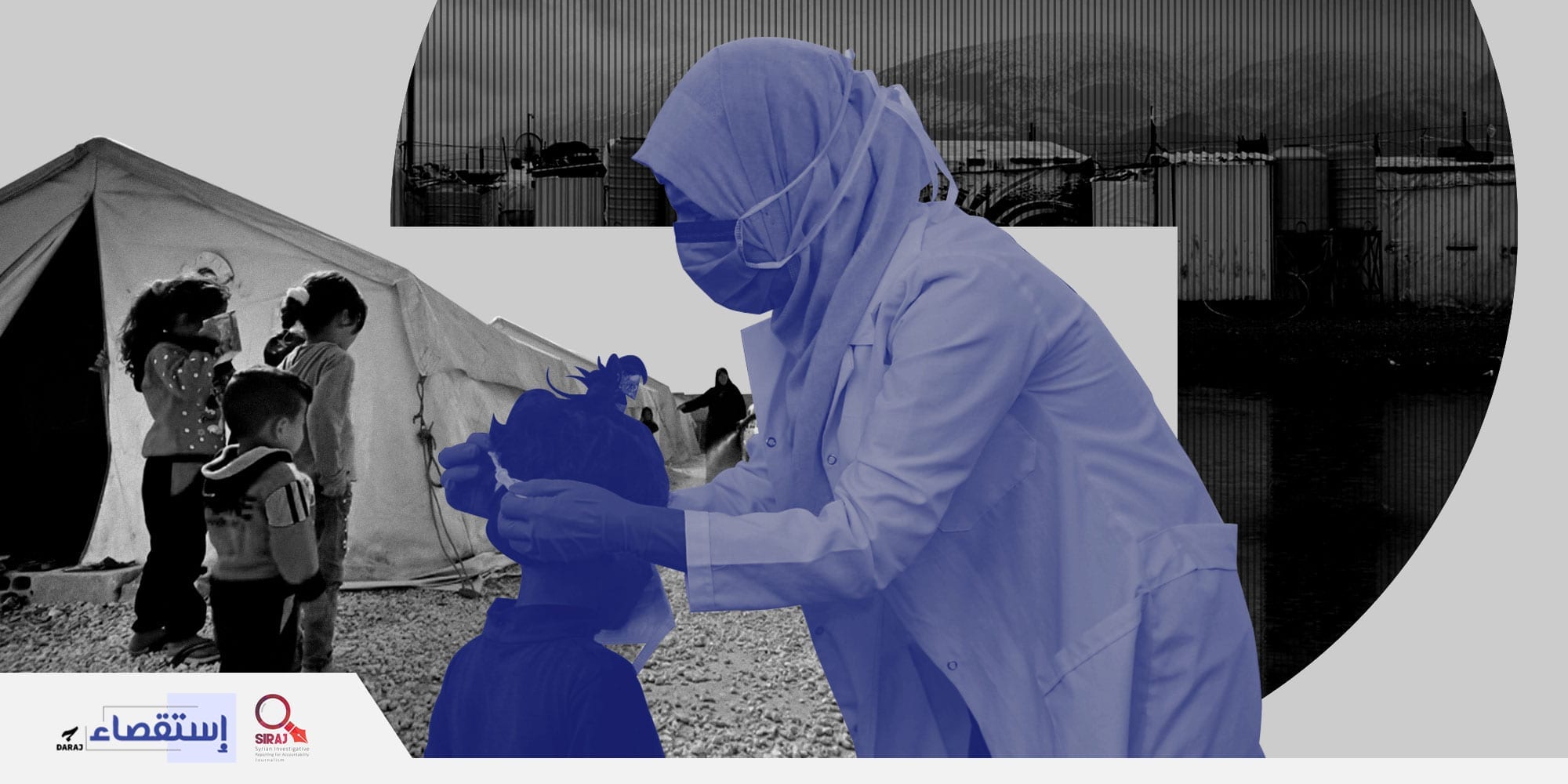The trick worked indeed. The child today stands at the door to his home, demanding that those coming in make sure to wash their hands with soap and water the right way. He even rebukes those not wearing a mask, including his father.
Using the trick successfully, Aiysha convinced her son (5) to keep the preventative rules. Nonetheless, the trick failed to mitigate the negative impact the measures addressing the virus, the ensuing lockdown and curfew, had on his life. Hussain’s personality was a lot different. He was psychologically shaken, turned irritable, and demanding. With a restless sleep, Hussain was less active at home and withdraw into his world on the second month of the lockdown.
Aiysha’s trick proved a successes at her home, but it failed to help Abu Rida, who lives with his sex children at a three square meter tent, surrounded by jammed tents at every side. The forty-something man heard that COVID-19 has arrived in Northern Syria; however, he could do nothing to protect his family.

1/3 of Syria’s children were deprived of education due to war; a larger proportion has been even denied necessary healthcare services.
UNICEF
In Syria, COVID-19 cases started to surge, while real case numbers were kept a secret amidst poor protective and preventative measures, as well as treatment efforts. Thus ominous, the situation threatens Syrians with a scenario that might bear a striking resemblance to the one suffered by Italy.
With its symptoms, the many people it rendered dead, the following closure of schools, curfews and bans on leaving home, COVID-19 had affected children in ways of dire consequences, which psychologists believe might be of a long-term.
Medically speaking, international studies concluded that infected children might show COVID-19 symptoms, including fever and high temperature. Even though children are less vulnerable to testing positive, Syria is currently witnessing large outbreaks. To date, there are no clear estimates of the pandemic’s spread, nor reports of child infections throughout the country, which might be attributed to the fragility of the healthcare system and shortage for diagnostic tests and laboratory equipment, which absence plays a key role in the underdiagnosis of cases.
Furthermore, interviews conducted with families throughout Syria point out the wide lifestyle gap between children from various geographical backgrounds. Children in the capital Damascus, for instance, have a different life from their peers in Northern Syria’s camps, where they are subjected to unmatching economic and social conditions, as well as different housing and living modes, let alone the environment-related discrepancies.
Given the current situation, psychologists are actually urging parents to maintain their calm and low stress levels, for children do mimic their actions.

2.6 million children have been forcibly displaced. About two million children are out of school. 3 out of 10 schools in Syria are destroyed or unusable.
– Human Rights Watch, 13 March 2020
“We know the poorest, most marginalised children who were already the furthest behind have suffered the greatest loss, with no access to distance learning – or any kind of education – for half an academic year,” Save The Children chief executive Inger Ashing said.
On the whole, this applies to all children around the world, but it, particularly, does not pertain to Syrian children, whose living conditions are largely different from children in other countries, as they have been doomed to lose a lot during the conflict.
According to a UNICEF report, one-third of Syria’s children were deprived of education due to war; a larger proportion has been even denied necessary healthcare services.
The Syrian Network for Human Rights, on its turn, documented the death of 29,296 children at the hands of main actors in Syria between March 2011 and last June.
Moreover, in a report entitled “They have erased the dreams of my children,” the Commission of Inquiry for Syria outlined multiple blatant right violations children have been subjected to, including death, miming, injury, orphaning, deprivation of education, and enduring the myriad violations by warring parties, as well as the displacement of over five million children, internally and abroad, over the course of the war.
The report, including interviews with more than five thousand children, witnesses, relatives of survivors and medical staffers conducted between 2011 and October 2019, states that “pro-Government forces have also deployed cluster munitions, thermobaric bombs and chemical weapons, claiming dozens of children casualties.”
Rape and sexual violence have been also used against men, women, boys and girls as a tool to punish, humiliate and instil fear among affected communities. On top of this bitter reality, which Syrian children are coerced to endure, here comes COVID-19 to rub salt in their wounds.

It is necessary to block rumours and inform children only of facts available on the Internet and social networking sites, to help them resist stress, particularly with the criticism aimed at governments that announce the daily number of cases, a thing that boosts anxiety and tension.
“On top of displacement,” here comes COVID-19
Ibrahim (13) was displaced a few months ago from the city of Saraqib, rural Idlib. Fleeing the shelling and the battles, he sought refuge in a small village east of Idlib. As if it was not enough that he lost his home, school and friends, cases of COVID-19 started emerging, destining him for heavier losses. Once again, Ibrahim was deprived of school and playing football, among many other things.
“As the coronavirus hit Idlib, my son’s life changed drastically. He was not allowed leaving home, going to school or the park, and playing with his friends,” Hussain’s father Jihad al-Ibrahim said, adding that it was displacement first, and then came the virus. Both have changed the child’s lifestyle.
Before COVID-19, his son went to school, had fun with friends and moved around freely. All of a sudden, everything stopped.
Of the most critical psychological effects that Ibrahim suffered were excessive irritation, spending long hours on the Internet and video games, according to his father, who added that: “He was awake till five in the morning, playing video games and surfing the Internet and slept for most of the daytime. He also asked me to by him an up to date cellophane so he could play PUBG.”
Ibrahim said that he used to meet his friends after school every day. They would gather somewhere and then play football. Nonetheless, he cannot do this today, while also robbed of the chance to spend summer at the town of Darkoush, western rural Idlib, expressing his great desire to enjoy all these activities when COVID-19 risk disappears.
In a report published on 13 March 2020, Human Rights Watch stated that 2.6 million children have been forcibly displaced. About two million children are out of school. Three out of 10 schools in Syria are destroyed or unusable.
Furthermore, the report noted that four out of five people in Syria live below the poverty line, leading to recruitment into fighting, child labor, and child marriage.

Horrified Children
When the Coronavirus pandemic first took over the world, Jana (11), from Suwaida province, was not scared. Nevertheless, she was grabbed by fear when the first case was reported in Damascus, especially because her grandparents are old and her father works at a shoe store, forced to get into contact with countless people, which makes them vulnerable to greatest risk from COVID-19.
All that Jana knows about the disease is that its symptoms resemble the flue, causing people to lose their sense of smell. Once the lockdown was enforced, Jana started doing sports, eating healthy food that boost the immune system, and washing her hands constantly to protect herself from the disease. This information, she got from TV, for she always joined her father as he watched the news.
“When the first case was reported, I was so scared for my father. When he stayed with us at home, since all the stores were closed, I was not as afraid as before. Upon reopening, fear struck me again, because my father gets into contact with many people,” Jana said.
The virus deprived Jana of leaving home and seeing her beloved friends. Her heart ached when schools were closed, she said, because she misses her friends, who were all forced to stay home.
“Fear, anxiety, and tension initially controlled my daughter, and the virus became all she talked about,” Jana’s mother said, referring to the negative impact the lockdown had on her daughter’s psychological health. The mother, however, cooperated with the child to smooth things down, helping her to do sports at home and other similar activities.
Summarizing the most critical behavioural and psychological disorders suffered by the girl, the mother pointed out to fear, heightened tension, and anxiety, as well as obsessed mentioning of COVID-19 and an intense interest in the quality of food.
The mother also noticed that Jana’s headaches went worse because she had excessive brain electrical charges, while she stayed up at night, turned more irritable and regularly bored.
“I believe that being afraid and the quarantine were the principal reasons that her headache seizures worsened,” the mother added, concluding that anxiety and tension badly affect Jana’s illness.

29,296 children died at the hands of main actors in Syria between March 2011 and last June.
– Syrian Network for Human Rights
Assessing the situation, psychiatrist Muhammad Abu Hilal said that the quarantine increased “socially unacceptable behaviours” among children to varying degrees, such as bullying those who cough, aggression, shouting, hyperactivity, sabotaging furniture, no to mention relentless complaining.
“The reason is that there are not enough child-friendly spaces in Syria. Then, there was the outbreak which complicated the situation for the children. Consequently, they became less active and further isolated from their peers at home,” he said.
The pandemic also gave rise to tension and fear of the disease, the signs of which were shown buy children, as they turned “obsessive” and confused about the appropriate manner of behaving, while many became less trusting of others.
“In general, the children’s language changed from one concerned with playing and studying, to one dominated by virus-related terms, mask and quarantine, which resulted in a new behavioural pattern among them,” the psychiatrist added.
The new pattern, the psychiatrist said, is represented by isolation and lack of social contact, the child’s loss of opportunities to learn from peers and play with them, hyperactivity, violence towards others at times, unjustified crying, mood swings, refusal to obey parents and negative feelings towards them, in addition to irregular sleep that corresponds to changing daily habits and spending long hours on cellophanes and video games.
Upward trajectory
This fear syncs to the mounting coronavirus cases that are recording an unprecedented upward trajectory across the country.
On 10 March 2020, the Syrian Ministry of Health announced the first COVID-19 positive case, confirmed as coming from abroad. The infection then started spreading, and cases ascended on the upward trajectory of the disease, both in regime-held areas and others out of its control.
Abu Firas, a Damascus-based father, has four children, the eldest is 13 and the youngest is only five months old, who turned more demanding amidst the outbreak. The more the pandemic lingered, the more the man and his wife were unable to keep up with the social and psychological condition of their children.
Umm Firas is a retired nurse; she left her job five years ago. Her husband, however, works in the healthcare industry.
The family’s life was organized, but it somehow drifted towards disorder as children stopped going to school, lacked any sense of obligation or definite activities to keep them busy.
“My children used to wake up at eight, go to school, return to do their homework, and then play with their friends. They slept at eight, having their play, computer and TV time all scheduled. Today, because these duties are absent, their life is no longer organized,” Umm Firas said.
“We tried to fill the spare time with at-home activities. Nevertheless, the Coronavirus measures have been going on for months, not a week or two. Therefore, following upon their day to day activities turned somehow tedious,” the husband added.
The eldest son, Firas, was crazy about football, and he waited impatiently for Friday to go with his friends to the stadium, taking the by way of the Sharia School where he studied before the outbreak. He almost had no spare time.
The parents attempt to provide their children with a breather. They visit their grandfather every Friday at his house in Damascus countryside. There, the place is less jammed, and the children get a safe opportunity to come into contact with people and meet relatives.
Sarah (11) is Firas’ younger sister. She was all about paper crafts, spending an hour or two everyday creating things. The girl, however, says that the hobby bored her during the quarantine, and it no longer helped her pass the time.
The family came across a volunteer teacher, who posted video lessons on Telegram, while other family members overcome the long unfilled hours by watching historical drama. “I reached the stage where I stopped keeping a track of their daily schedule. At one point, I even grew irritable. I returned home from work needing to rest and fearing that I could pass them the virus, for I get into contact with dialysis patients, while my children had a lot of energy, being at home,” Abu Firas said.
As a result, the children quarrelled increasingly, jabbed at each other and turned more irritable. The family is also concerned over the worst case scenario — a further spread of the virus with the daily rise in positive cases in Syria. Despite the increase, the family began to allow children to go outside, while maintaining tight preventive measures, for keeping them at home all the time has become impossible.
Age-based response
Psychologist Taher Laila, head of the psychosocial and social support team at the Syrian American Medical Society (SAMS), said that: “Children differ according to their age groups.”
“Those under the age of six can understand the anxiety surrounding them, but it is difficult for them to comprehend quarantine, the virus and its consequences,” he added, stressing that the parents’ duty, in this context, is to advise them and find simple ways to communicate ideas to them, explain the importance of social distancing, and the reason for staying home.
He pointed out that, at this age, children tend to develop feelings of guilt when they are not allowed out to play or are not hugged by their father when he is home from work. Children, thus, blame themselves, which necessitates that they get all these ideas explained.
Furthermore, he stressed the need to block rumours and inform children only of facts available on the Internet and social networking sites, to help them resist stress, particularly with the criticism aimed at governments that announce the daily number of cases, a thing that boosts anxiety and mental strain.
Dealing with children amidst the outbreak, Lila stated, demands that parents maintain low levels of concern, because children imitate their parents’ personalities, becoming stressed, as well. Parents, therefore, must keep their composure and address the pandemic with scientific preventative measures.
Moreover, Lila explained that the story was made rather complicated for children, because they need free and safe spaces to move around. With numerous families living in camps, while others are impoverished, capable of affording the costs of small houses only, due to displacement in Syria, in addition to lacking electricity, Internet and recreational activities, the space dedicated for children was subjected to restrictions with excessive energy that needs to be let out.
The unchanneled excessive energy, the psychologist added, causes children to be sad, depressed and isolated, and renders them anxious, becoming not only demanding, but also vulnerable to other symptoms such as intense anger, and stubbornness at times. This pressure, in fact, affects children’s social skills, through which they manage to integrate into society and communicate with their surroundings. These effects might, in turn, influence their social intelligence, making them shy, lacking in spirit and withdrawn.
In case of primary-school-age children, Lila stated that prolonged confinement to home might affect their linguistic skills.




